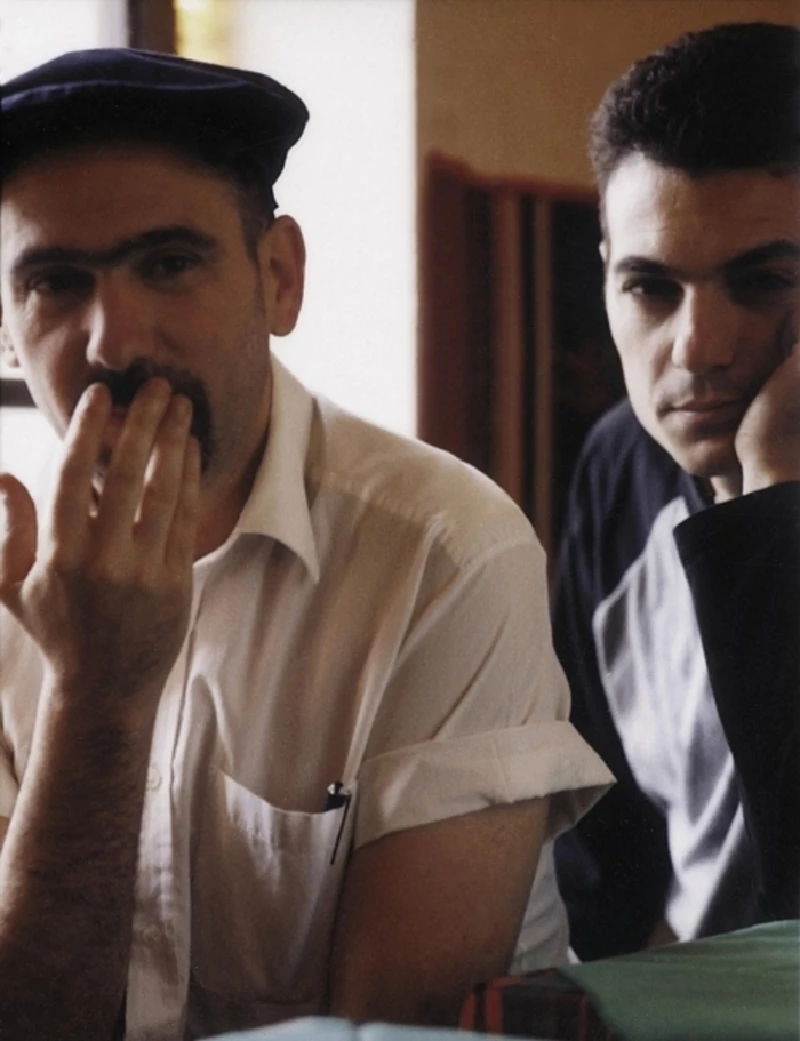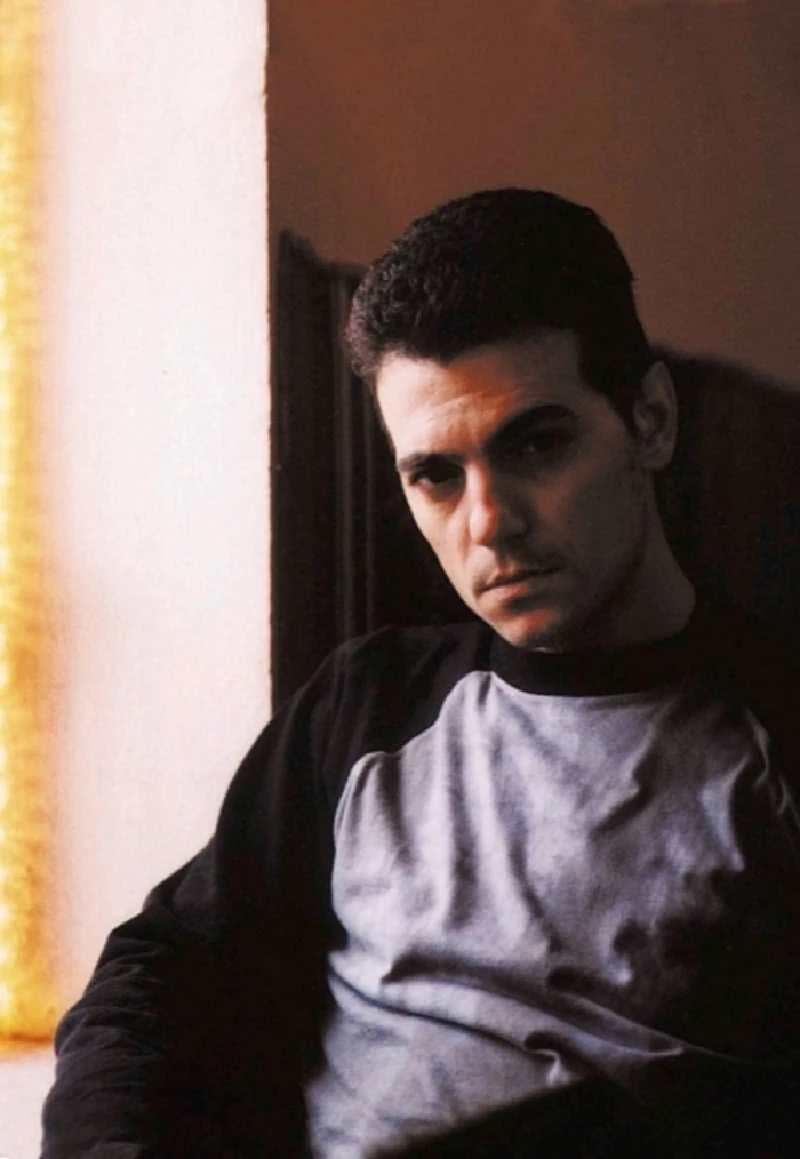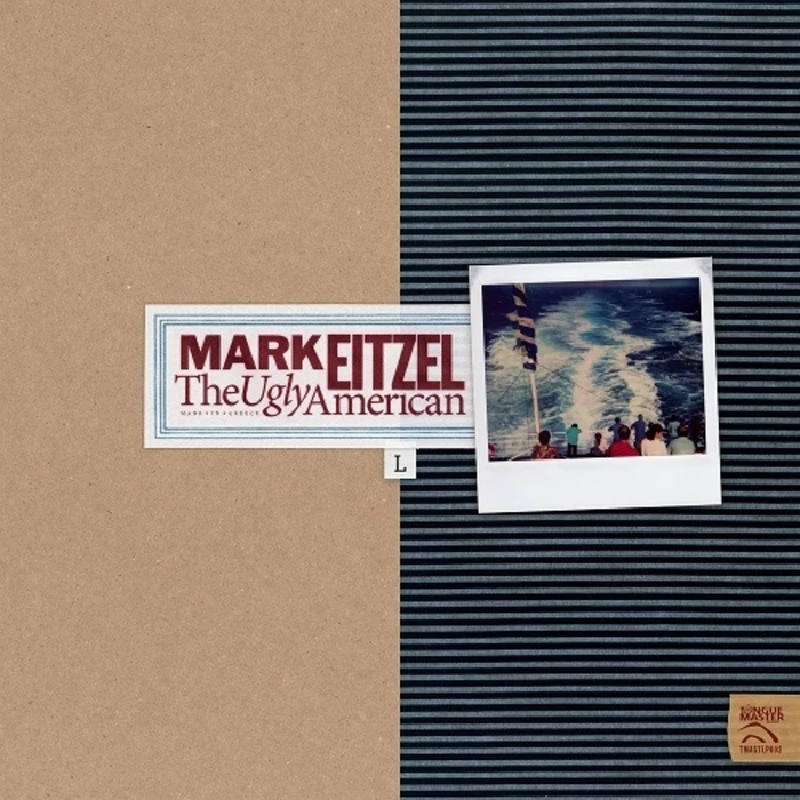Manolis Famellos - Interview
by John Clarkson
published: 16 / 7 / 2020

intro
Producer and singer-songwriter Manolis Famellos talks to John Clarkson about the recording and re-release on vinyl of American Music Club frontman and solo artist Mark Eitzel’s 2003 eighth solo album 'The Ugly American', which Eitzel worked upon with him and a group of Greek traditional musicians.
In November 2001, two months after 9/11, American Music Club frontman and solo artist Mark Eitzel flew to Athens to work with Greek producer and songwriter Manolis Famellos and a group of local musicians he had put together on some recordings. It was originally proposed that they would record an EP, but the sessions proved so successful that this expanded into an album, ‘The Ugly American’. The aim of the sessions was to take some of Eitzel’s songs, both with the American Music Club and in his solo career, and to re-evaluate them using traditional Greek instruments such as bouzoukis, tzouras, a Cretan lyra and zournas. The project has caused controversy, some of Eitzel’s more reactionary fans seeing it as too far removed from his roots as one of the pioneers of the Americana movement. ‘The Ugly American’ is an astonishingly beautiful album, which, however, gives a fresh interpretation to Eitzel’s original compositions and with its Greek instrumentation embeds its songs -nine Eitzel compositions and one by Famellos – with a new lushness and passion. ‘The Ugly American’ is being re-released on the 14th August seventeen years after it came out in 2003 by its original UK label Tongue Master Records on vinyl for the first time in a limited edition of 500 copies. In a rare interview, Manolis Famellos spoke to Pennyblackmusic about its recording and reissue. PB: It has been said on various occasions that Mark Eitzel took a considerable risk going to work in Greece with a group of musicians, none of whom he had ever met before, but you took an equal risk in inviting him. Why did you decide to make the offer to him? MF: I am not aware exactly of the ins or outs of who made the invitation. Theodore Vlassopulos of Tongue Master had the idea and pitched it to Greek label Hitch-Hyke who made all the arrangements. I was personally asked in an inquisitive manner about the possibility of working with Mark. I presume that was because I was someone who understood the Greek sound; I was a singer songwriter and my productions did meet with the Indie ethos. I was also a keen follower of all the American Music Club material from the Eighties. To be honest, the risk was also preying on me as I had not even concocted a band for this task, even though the central idea was there. There was, however, a mutual need for experimentation. Nobody was aware of the direction we would take and we did not know if we or Mark would be happy with the result. To sum things up, I would say it was an insane idea like no other but we could not really do anything else but give it a try. We sailed into the unknown which always happens in music. PB: Mark Eitzel’s previous album ‘Music for Courage and Confidence’ had been a covers album, and on ‘The Ugly American’ he covered himself. Do you think that was entirely coincidental or was one of the main reasons why he travelled to Athens to work with you? MF: As far as I can recall, he might have been a bit hesitant due to another album that was in the works. I believe it was more the desire for adventure from his side, and for us it was a hilarious and joyous adventure that we will never forget. Even if ‘The Ugly American ‘did not ever materialize, I would have been content just for the experience I had. PB: ‘The Ugly American’ was recorded just two months after 9/11. What impact did that have on the album? MF: It was a subject that constantly loomed in our discussions. As I recollect it, we had booked the tickets, the studio and done all the programming beforehand. We were frozen with anxious anticipation if Mark would commit to this long trip. It did not seem to faze him in the end about repercussions of that turbulent period. PB: ‘The Ugly American’ was originally proposed as an EP. At what point did it become a LP? MF: From the beginning of the rehearsals new ideas were adapted on various songs which would have been a shame for me not to try and document. It was a new aural environment unbeknown to him and for us. PB: The album features a crossover of songs from throughout both Eitzel’s solo and American Music Club career. It includes then relative obscurities such as ‘Anything’ and ‘What Good is Love?’ as well as some of his best-known songs. What was your criteria for deciding which songs you were going to interpret? Why are there three –‘Western Sky’, ‘Jenny’ and ‘Last Harbor’ – from the American Music Club’s 1988 album ‘California’? MF: It was the record that I had heard the most and had tried the songs with the outfit before Mark arrived in Greece – for example ‘Jenny ‘ was my favourite and I even used to perform this. Mark, Theodore and all the album’s participants all made fertile suggestions. There was a good dynamic on this record. The songs were scattered, plucked from different periods but I feel there is a cohesive unity to the material. We were both lucky because at that period I was playing in a band which had a magical chemistry that was tried and tested in an exceptionally difficult environment in the studio and at live events. On many occasions I worked as ‘just another musician’ within the outfit leaving the various contributions everyone gave to mesh freely with each other. Maybe in some songs it was not even necessary for me to add anything. Many of the additional musicians that we used in the recording had no idea who Mark Eitzel was and no idea about the type of material they would encounter. We never, however, felt hindered or bogged down at any point during this project. On the other hand, nobody knew what to expect with the final takes of all the material. I wonder and I am still pleasantly surprised until this very day with the freshness all these new adaptations have. PB: ‘The Ugly American’ is closed with ‘Love Humming’, which is one of your own songs. It fits in really well with the rest of the album but why did you decide to include that on an album of Eitzel reinterpretations? MF: Mark stayed a lot in Athens and managed to see some of our live concerts. He wanted in his own way to reciprocate the favour…We transcribed the lyrics from Greek to English together. With a combined effort we mirrored each other. PB: When many Eitzel fans heard that he was travelling to Greece to work with a group of Greek musicians they saw this as ‘sacrilege’. Was that something which worried or concerned you? MF: I cannot grasp how something like that could be said. I do not know what to say about this. It would help me to understand what somebody would consider holy so I can have an understanding how this could be violated. The truth is that I would love to ascertain their way of thinking. Every artist that makes a stride forward might in a way commit sacrilege. And maybe that is the only way. PB: It was released in Europe on Tongue Master Records and was their first LP release. Why did you choose such a then unknown and new label to release it? MF: The Greek label Soul Sister (a subsidiary of Hitch Hyke) paid for all of it and was subsequently going to pitch it to Matador or any interested label. Unfortunately, Matador severed their ties with Mark Eitzel, before the ‘Music For Courage And Confidence ‘release and Mark was effectively label-less. Hitch Hyke subsequently graciously offered the album to Tongue Master for the UK and parts of Europe and to Thirsty Ear in the US. The album was released elsewhere in Europe as a Soul Sister release. PB: Did you and your band of Greek musicians ever play live with Eitzel? Is it a regret that you did not have more opportunities for live work with him? MF: Mark Eitzel can make any human cry laughing , even if they cannot speak English. The truth is that he did venture on stage with us – only once. Whoever was there to witness it that day -I guarantee they will never have forgotten it. During the production we did travel around Greece and he stayed at my house and after a few years I stayed at his house in San Francisco. We even worked on putting some of my songs into English, and that was released a few years ago. I would have loved to have done more together but unfortunately a whole continent divides us and then a huge ocean and then another continent. I believe though this chapter remains open. PB: Were you surprised when Tongue Master announced that they were planning to do a vinyl reissue of ‘The Ugly American’? How do you feel that it stands up almost twenty years on? MF: You always are happy to see something that you contributed to years ago still be alive. I would like on this occasion for it to be heard further afield. I am afraid in our current period people tend to collect vinyl to notch their fetish desires. Unfortunately, the content is relegated to the back seat. From one angle it could seem like a postcard from a different era… A bit of brighter reflection on today’s world if you consider what has happened to Greece and the world since then. On the other hand, it does remind me how the future does remain always open for those who have the desire to explore some imprudent art. PB: Thank you. Thank you to Theodore Vlassopulos for his help in organising this interview.
Band Links:-
http://www.markeitzel.com/https://en.wikipedia.org/wiki/Mark_Eitzel
http://www.tonguemaster.co.uk/
https://www.facebook.com/pages/category/Musician-Band/Manolis-Famellos
https://twitter.com/manolisfamellos
Play in YouTube:-
Picture Gallery:-


most viewed articles
current edition
Carl Ewens - David Bowie 1964 to 1982 On Track: Every Album, Every SongArmory Show - Interview with Richard Jobson
Colin Blunstone - Thalia Hall, Chicago, 16/7/2025
Bathers - Photoscapes 1
Visor Fest - Valencia, Spain, 26/9/2025...27/9/2025
Billie Eilish - O2 Arena, London, 10/7/2025
Robert Forster - Interview
Loft - Interview
John McKay - Interview
Editorial - July 2025
previous editions
Heavenly - P.U.N.K. Girl EPManic Street Preachers - (Gig of a Lifetime) Millennium Stadium, Cardiff, December 1999
Oasis - Oasis, Earl's Court, London, 1995
Beautiful South - Ten Songs That Made Me Love...
Trudie Myerscough-Harris - Interview
Pixies - Ten Songs That Made Me Love...
Prolapse - Interview
Doris Brendel - Interview
Simon Heavisides - Destiny Stopped Screaming: The Life and Times of Adrian Borland
Paul Clerehugh - Interview
most viewed reviews
current edition
Amy Macdonald - Is This What You've Been Waiting For?Sick Man of Europe - The Sick Man of Europe
Alice Cooper - The Revenge of Alice Cooper
Phew, Erika Kobayashi,, Dieter Moebius - Radium Girls
Davey Woodward - Mumbo in the Jumbo
Lucy Spraggan - Other Sides of the Moon
Blueboy - 2
Cynthia Erivo - I Forgive You
Philip Jeays - Victoria
Lapsley - I'm a Hurricane, I'm a Woman In Love
Pennyblackmusic Regular Contributors
Adrian Janes
Amanda J. Window
Andrew Twambley
Anthony Dhanendran
Benjamin Howarth
Cila Warncke
Daniel Cressey
Darren Aston
Dastardly
Dave Goodwin
Denzil Watson
Dominic B. Simpson
Eoghan Lyng
Fiona Hutchings
Harry Sherriff
Helen Tipping
Jamie Rowland
John Clarkson
Julie Cruickshank
Kimberly Bright
Lisa Torem
Maarten Schiethart